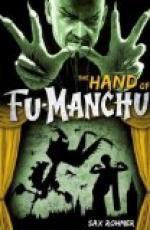Weymouth laughed shortly.
“Evidently you don’t recognize Dr. Petrie!” he said.
“Eh!” cried Ryman—“Dr. Petrie! why, good heavens, Doctor, I should never have known you in a month of Bank holidays! What’s afoot, then?”—and he turned to Weymouth, eyebrows raised interrogatively.
“It’s the Fu-Manchu business again, Ryman.”
“Fu-Manchu! But I thought the Fu-Manchu case was off the books long ago? It was always a mystery to me; never a word in the papers; and we as much in the dark as everybody else—but didn’t I hear that the Chinaman, Fu-Manchu, was dead?”
Weymouth nodded.
“Some of his friends seem to be very much alive, though” he said. “It appears that Fu-Manchu, for all his genius—and there’s no denying he was a genius, Ryman—was only the agent of somebody altogether bigger.”
Ryman whistled softly.
“Has the real head of affairs arrived, then?”
“We find we are up against what is known as the Si-Fan.”
At that it came to the inevitable, unanswerable question.
“What is the Si-Fan?”
I laughed, but my laughter was not mirthful. Inspector Weymouth shook his head.
“Perhaps Mr. Nayland Smith could tell you that,” he replied; “for the Si-Fan got him to-day!”
“Got him!” cried Ryman.
“Absolutely! He’s vanished! And Fletcher here has found out that John Ki’s place is in some way connected with this business.”
I interrupted—impatiently, I fear.
“Then let us set out, Inspector,” I said, “for it seems to me that we are wasting precious time—and you know what that may mean.” I turned to Fletcher. “Where is this place situated, exactly? How do we proceed?”
“The cab can take us part of the way,” he replied, “and we shall have to walk the rest. Patrons of John’s don’t turn up in taxis, as a rule!”
“Then let us be off,” I said, and made for the door.
“Don’t forget the signal!” Weymouth cried after me, “and don’t venture into the place until you’ve received our reply....”
But I was already outside, Fletcher following; and a moment later we were both in the cab and off into a maze of tortuous streets toward John Ki’s Joy-Shop.
With the coming of nightfall the rain had ceased, but the sky remained heavily overcast and the air was filled with clammy mist. It was a night to arouse longings for Southern skies; and when, discharging the cabman, we set out afoot along a muddy and ill-lighted thoroughfare bordered on either side by high brick walls, their monotony occasionally broken by gateways, I felt that the load of depression which had settled upon my shoulders must ere long bear me down.
Sounds of shunting upon some railway siding came to my ears; train whistles and fog signals hooted and boomed. River sounds there were, too, for we were close beside the Thames, that gray old stream which has borne upon its bier many a poor victim of underground London. The sky glowed sullenly red above.




